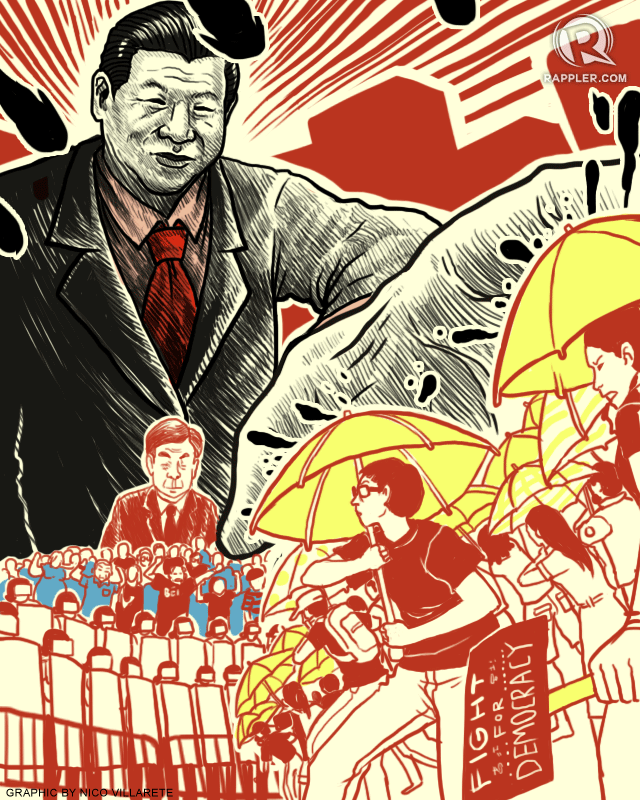SUMMARY
This is AI generated summarization, which may have errors. For context, always refer to the full article.

It’s an epic standoff, one that boggles the imagination in the same way that the fall of dictator Ferdinand Marcos or the disintegration of the Soviet Union did. Its historic implications for Asia geopolitics and managing mixed economies have yet to hit our collective shores.
How could students led by a 17 year old defy the most powerful centralized political entity on earth which rules over 1.3 billion people? How can this state – which gunned down pro-democracy activists in 1989, purged all records of that massacre from history books and systematically monitors and snuffs out dissent among its mainland citizens – find itself exercising maximum tolerance towards a bunch of book-totting dreamers? How can umbrellas and raincoats and cell phones stand up to bullets and police batons?
Beyond the meme-worthy umbrellas, Occupy Central is a test of China’s ability to navigate a political minefield of international proportions. China dreads a repeat of the 1989 Tiananmen massacre that split the Communist Party and demonized the Central Committee worldwide. And President Xi JInping, whom analysts say is averse to showing any hint of weakness, will do everything to not lose face at home, where China has maintained an iron fist against pro-democracy activists, or abroad, where it arrogantly claims the whole of South China Sea.
Does Beijing have a strategy for peacefully diffusing this ticking PR nightmare? It seems to be adopting a wait-and-see approach, perhaps hoping that Hong Kong’s business side would eventually win over this rogue, defiant spirit. But here’s the crux of the standoff: There is no hint that Beijing is willing to give modest concessions to a movement that does not seem ready to settle for small change.
The doctrine of “one country, two systems” has been in place since the 1997 handover, but it is only recently that its potential for discord has been made painfully obvious to Beijing. The continuation of Hong Kong’s political and economic system for 50 years was guaranteed – until Beijing decided to tinker with it. The promise of electoral independence is broken, driving people to street protests never before seen in this financial hub.
Who would have thought that the pragmatic and profit-minded Hong Konger had it in him to protest in the streets for weeks? Maybe China underestimated its long-estranged cousins, whose upbringing under the British with its capitalist economy and liberal thought is now rearing its ugly head. Most of the students who make speeches, clap, sleep and even study in the protest lines were babies during the handover. They don’t have the institutional fear and memories of repression that their counterparts in China do.
Occupy Central protests reverberate among Filipinos. From the People Power movement in 1986 to the Million People March in 2014, we, more than any other Southeast Asian neighbor, get it. We know what it’s like to fight for an idea, for a right, for freedom.
We hope that Hong Kong’s fight for suffrage will resonate more with our countrymen who have not fully learned to value the power of the vote. In the face of Hong Kong residents’ gallant stand, Filipinos should be reminded not to take such a precious gift for granted.
We stand in solidarity with the people of Hong Kong and salute their courageous spirit, as we hope for their struggle to be guided by cool heads, mature minds and less politicking – and achieve its desired results. – Rappler.com
Add a comment
How does this make you feel?
There are no comments yet. Add your comment to start the conversation.